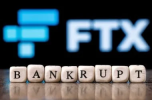- Date
- 23 November 2022
FTX Update
FTX Update
By Jake Rickman Image Credit - Sergei Elagin / Shutterstock.com |
What do you need to know this week?
In the spirit of keeping up with developments, we return to FTX’s collapse for the second week. It has emerged that FTX and affiliated entities owe creditors a total of $3bn to their largest creditors, according to an article published by the Financial Times.
It is estimated that their current liabilities in total exceed $10bn. Of this, 50 creditors are owed more than $20m each and the total number of creditors, which primarily consist of retail crypto-traders, is estimated to be more than 1 million.
In a damning indictment of FTX’s senior leadership, John Ray III, the restructuring professional who was appointed as acting CEO on 11 November, said in a Chapter 11 filing:
“I have over 40 years of legal and restructuring experience… Nearly every situation in which I have been involved has been characterised by defects of some sort of internal controls, regulatory compliance, human resources, and systems of integrity. Never in my career have I seen such a complete failure of corporate controls and such a complete absence of trustworthy financial information… From compromised systems integrity [sic] and faulty regulatory oversight abroad, to the concentration of control in the hands of a very small group of inexperienced, unsophisticated and potentially compromised individuals, this situation is unprecedented.”
Why is this important for your interviews?
Last week, we discussed the implications of financial institution insolvency and how it can raise more complex restructuring issues, such as in the case of Enron and Lehman Brothers’ respective collapses. The fact that FTX deals in cryptocurrencies raises even thornier questions, largely due to the uncertain legal and financial position of such assets.
One example of this is the legal position of FTX’s retail account holders. Under general principles of banking law, retail customers who deposit money with a bank are merely unsecured creditors. That is, they rank towards the bottom of the order of priority in the event of the bank’s insolvency and therefore are unlikely to recover all their money (though in practice, regulators in the United States and the UK guarantee the deposits).
However, US law is unclear as to the nature of the legal relationship between crypto-exchange platforms like FTX and their customers. This is despite having similar business models — where customers deposit their crypto-coins (cash) and the platform (the bank) uses the deposits to generate returns.
Specifically, might FTX hold certain customers’ cryptoassets on trust for them? If this is the case, these customers may not be creditors at all, but beneficiaries. In which case, these assets do not in fact make up FTX’s estate in bankruptcy and would therefore not be available to other creditors.
Complicating this, as Mr Roy implied in his blistering pleading, is that FTX’s failure of leadership means that properly untangling the group’s assets from its liabilities.
How is this topic relevant to law firms?
Sullivan & Cromwell continues to serve as FTX’s counsel, in addition to Landis Rath & Cobb, which is a boutique firm with a specific focus on bankruptcies and restructurings in Delaware.

